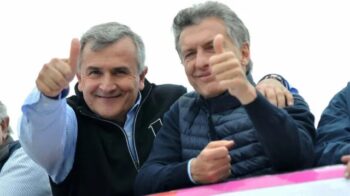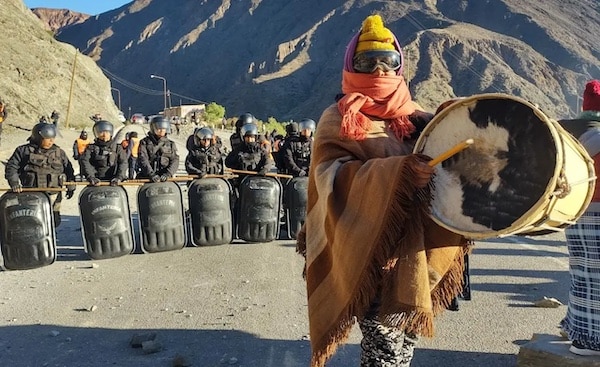Police repression of mass protests regarding provincial constitution reforms—threatening the right to protest and land workers’ rights—have led to at least 68 people being arrested and 170 injured this Tuesday, June 20. The events in the lithium-rich province of Jujuy, Argentina, have mobilized spokespersons of the international community and human rights defenders around the world.
Reforms of the provincial constitution have deepened the differences between union organizations, indigenous communities, social movements, and the regional government of the opposition leader Gerardo Morales. Governor Morales has been in power for the last eight years, and belongs to the right-wing alliance led by former President Mauricio Macri.
Background
- The first action of Gerardo Morales, when he became governor, consisted of an express reform of the judicial system, where he expanded the maximum jurisdictional court from five to nine members, including two former deputies of his party.
- With the courts in his favor, he began an attack against Milagro Sala of the Túpac Amaru neighborhood association, a social leader who overshadowed his questioned leadership, whom he imprisoned for protesting against his right-wing policies.
- He launched a budget cut in the education sector, that caused the closure of numerous courses and a mass layoff of teachers.
- Morales promoted a xenophobic campaign against the Plurinational State of Bolivia, with which Jujuy shares a direct border.
- Morales endorsed Macri’s “indebtedness” policy, holding a fiscal policy in favor of companies and capitals—foreign and local—mainly associated with lithium exploitation.
Unconstitutional regional constitution reform
With only one month of alleged discussions—behind closed doors—the constitutional reform, modifying 193 of the 212 points of the 1986 Regional Constitution, was approved this Tuesday, with 40 out of 48 possible votes and in the midst of the resignation of leftist assembly members.
The controversy and popular uprising against the provincial constitutional text is centered on at least two major issues:
- Criminalization of protests, conditioning the right to permits issued by regional bodies and prohibiting freedom of demonstrations.
- Modification of the right to land ownership, incorporating fast-track registration and forced eviction.
Both issues have alarmed and affect the 300+ indigenous communities that inhabit the area of Jujuy, the nerve center of mining and lithium exploitation in Argentina, and part of the U.S. SOUTHCOM-targeted region known as the Lithium Triangles, shared between Bolivia, Chile, and Argentina.
 Several legal experts and human rights organizations warn that the reform is incompatible with the rights enshrined for indigenous peoples in international treaties and in the constitution of the Argentinian Republic.
Several legal experts and human rights organizations warn that the reform is incompatible with the rights enshrined for indigenous peoples in international treaties and in the constitution of the Argentinian Republic.
Who is Gerardo Morales?
“For those who do not remember or were not born yet, I recommend once again the series “December 2001″ by director Benjamín Ávila, which has been shown for a few days now on a well-known platform and which narrates the events [of that year] that culminated in the state of siege and the death of 38 Argentinians,” Cristina Kirchner noted regarding Morales.
Paradoxically, the same governor [Gerardo Morales] who today ordered the repression in Jujuy, was a high official of that government of the First Alliance that established the state of siege and was responsible for those deaths.
Although, in 2011, Morales managed to reach the senate for the minority opposition, by that time he already had a history of electoral defeats in his race for the governorship of the province. This situation was reversed in 2015, thanks to a radical right-wing alliance against Peronism, led by Mauricio Macri.
Destabilizing agenda
Gerardo Morales and the movement Juntos por el Cambio (Together for Change) insist on blaming the government of Alberto Fernández for fueling recent protests, where indigenous movements are demanding their territorial rights and their right to their ancestral lands. In doing so, their movement is following to the letter the discourse of ungovernability promoted by Macri, which seeks to break the national hegemony of Peronism, in view of the upcoming presidential elections, where Morales has been emerging as a possible candidate.
Hágase cargo Gobernador Morales y pare con la locura represiva que su propio accionar ha desatado. Lo que está sucediendo en la Provincia de Jujuy es absoluta responsabilidad suya y usted lo sabe.
Pareciera que la represión salvaje está en su ADN. Usted fue un alto funcionario…
— Cristina Kirchner (@CFKArgentina) June 20, 2023
Contrast with Venezuela
Meanwhile in Venezuela, the Chavista government addressed a similar controversy last week regarding the Yukpa indigenous people using a very radical and different approach. The government sent high-ranking officials to hold meetings with the indigenous community in order to address their demands, following protests in the state of Zulia, bordering Colombia.
The Argentinian government and its foreign ministry, led by Alberto Fernández, have maintained an approach of attacking Venezuela on its alleged so-called bad record of human rights, when in reality the approach of the Chavista government towards social demands is far more humane than those of Argentina and the governments that have accused Venezuela of the contrary, in accordance with U.S. instructions.
(RedRadioVE) by Fransay Riera, with Orinoco Tribune content
Translation: Orinoco Tribune

